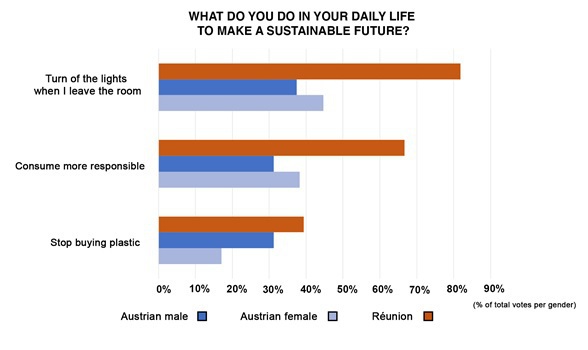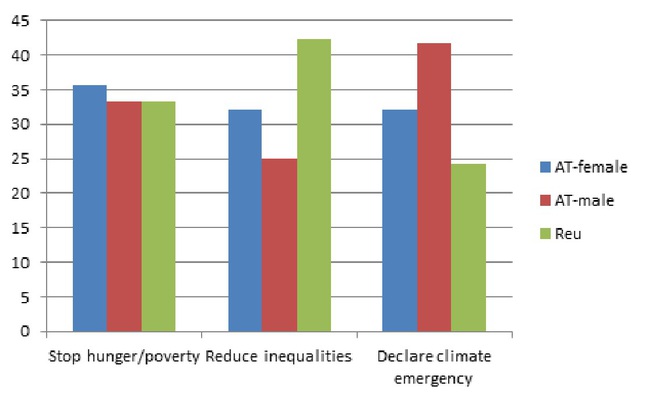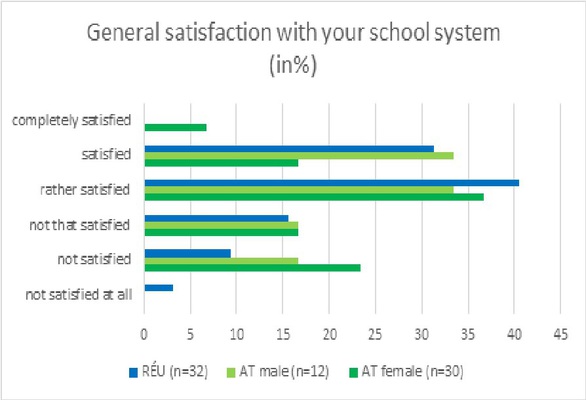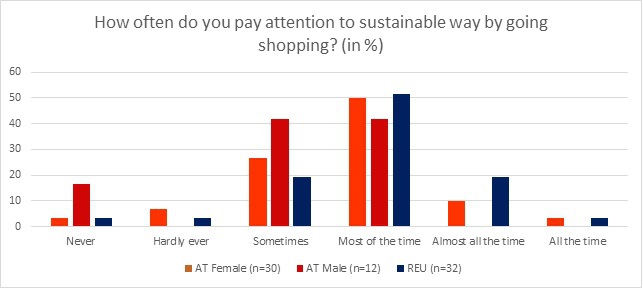Results for Reunion:
results joint questionnaire.pdf
Most students in the class are aware of the fact that we need to reduce our consumption of energy.
The biggest concern of most students in the class is reduction of inequalities.
For more than half of the class, environmental protection is extremely important. The major part of the class is very concerned about evironmental protection.
A third of the class is afraid of natural disasters because the climate is changing too fast and natural disasters become unpredictable and stronger and stronger.
The most important personal value for the class is family and friends, and the least is religion.
Nearly half the class is raher satisfied of our general school system.
Half the class declares paying attention most of the time to sustainability by going shopping.
The most important criteria for a majority of the students for a sustainable way of buying products is durability and the least is packaging.
Interpretations from Austria
Q 1 :

In the first poll we wanted to know what people do in their daily life to make a sustainable future.
The main question of the first poll was “Do you turn of the lights when you leave the room?”. Reunion results showed that over 80% of boys and girls do this. This could highlight that the people there are quite consequent with their energy consumption.
In Austria, we see that females are way more consequent when it comes to turning of the lights.
“Consume more responsible” is the second option and wasn´t ticked that often than the first one! In Reunion we now have less then 70%. I guess it´s because a responsible consumption is way harder to achieve than flipping a switch now and then. The same in Austria. Like before, the females still lead the race, and the number of boys sunk to 30%.
The last possible answer to tick was “Stop buying plastic”. The results of this question were the most surprising. You can see that Réunion’s results were quite high in the first two categories, but now the chart shows, that less than 40% would stop buying plastic. In Austria, the number of males that would stop buying plastic suddenly almost doubles the girls, achieving way higher results then the females!
Q 2 :
If you could take one important decision what would you do for your country?

This particular diagram shows which following changes in the world (to stop world hunger, to stop inequality between men and women or stopping climate change) adolescence would choose if they could. If you take a look at the Austrian youths you can see that there are some certain differences between male and female participants. Most women, about 36 percent would stop world hunger if they could. Compared to men who would want to stop our climate change, at least 43 percent ticked this choice. 33 percent of the female participants also chose saving our climate. More women then man are interested in equality between both genders, about 33 percent of all the women and about 25 percent of the men who took part in the survey.
If you compare Austria and Réunion there are many noticeable differences between the countries. It’s important to consider, that Réunion doesn´t split male and female participants into different groups. To stop inequality is the most important to youths in Réunion, about 43 percent chose this option. Almost the same amount of people in Austria and Réunion chose stopping world hunger, with about 33,5 percent. Very interesting is the fact that declaring a climate crisis is more important to Austrians then it seems to be to Reunions. About 42 percent of male Austrians and 33 percent of female Austrians chose this particular option compared to only 24 percent of Reunions.
Q 6 :

The upper half of the Graph shows that most Austrian students are satisfied with their school system. The average answers varies between “ satisfied” and “rather satisfied”. Their are only few exceptions, like the fact that only few (check Graph) Austrian boys picked “completely satisfied”.
A lot of the students from Réunion are happy with their school system. And many Austrian females agree to this statement. Less than 2/4 of the students are not that satisfied with their school system. What seems to be interesting is that only students from Réunion said that they were completely displeased with their school system.
Finally, it becomes apparent that there are major fluctuations among the Austrians between complete satisfaction and not satisfied. Two third of the Austrians are basically satisfied with the Austrian school system. Even among the students from Réunion, it can be said that quite a bit more than half of the students are relatively satisfied.
Q 8 :
